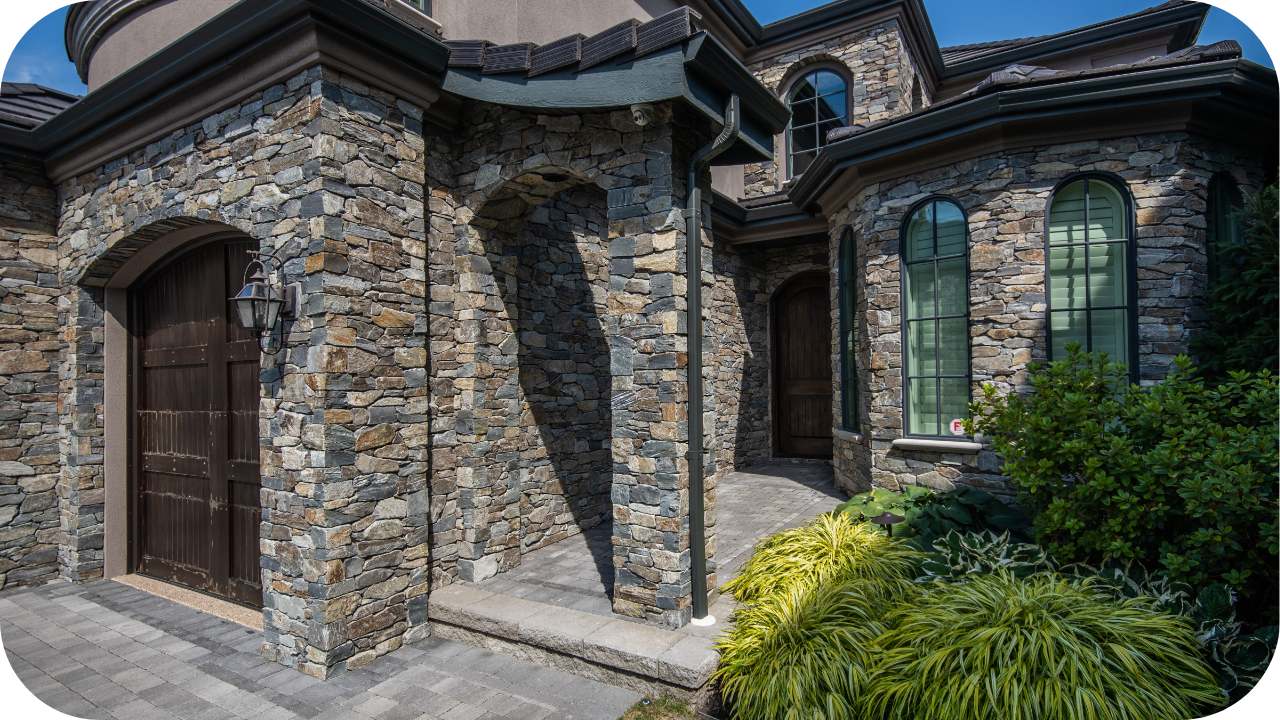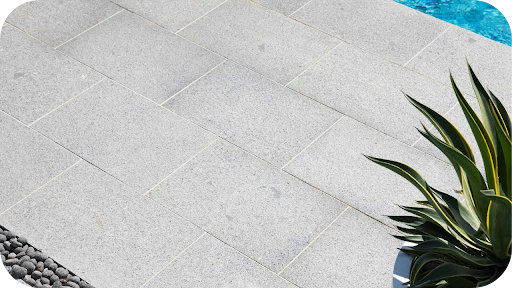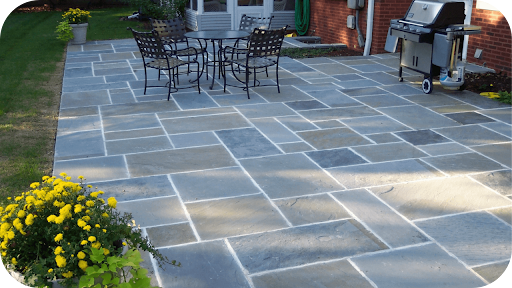
Natural stone facades are an excellent way to enhance your home’s exterior with timeless elegance, durability, and character.
Whether you’re updating your façade, adding a new feature wall, or incorporating stone accents, natural stone offers both beauty and strength. With a variety of stone types, finishes, and colours available, it complements any architectural style, from modern to rustic.
This article will show you how to create a lasting first impression with natural stone façades, offering practical design tips, material recommendations, and long-term value.
Why Choose Natural Stone for Your Home’s Façade
Natural stone façades offer more than just aesthetic appeal. Here’s why they’re the ideal choice for enhancing the exterior of your home.
1. Creates a Striking Visual Impact
Natural stone façades add depth, texture, and elegance to your home. The unique veining and colour variations create a bold visual presence, boosting curb appeal and making a lasting impression while elevating your property’s design.
2. Withstands Harsh Weather for Long-Term Performance
Natural stone is built to endure the toughest weather conditions. Its resistance to fading, cracking, and erosion ensures your façade remains durable and visually appealing, even in extreme Australian climates, offering reliable performance year after year.
3. Regulates Indoor Temperature with Natural Insulation
Limestone, granite, and other natural stones offer exceptional thermal insulation properties. These stones help maintain a comfortable indoor temperature by reducing reliance on heating and cooling systems, leading to lower energy costs and greater year-round comfort.
4. Requires Minimal Maintenance
Natural stone façades require very little upkeep compared to other materials. With occasional cleaning and sealing, stone retains its beauty while resisting damage from stains, dirt, and harsh weather, making it a cost-effective long-term solution.
5. Increases Property Value with Timeless Appeal
A natural stone façade significantly boosts your property’s market value. Its elegant, timeless appearance not only enhances curb appeal but also increases desirability, ensuring a high return on investment if you decide to sell.
Popular Natural Stones for Facades
Natural stone facades are available in various types, each offering unique characteristics and beauty. Here are some of the most popular natural stones for facades, along with ideal varieties for each.
- Limestone: Beloka Limestone offers rich tones, while Barwon Limestone adds a rugged texture, both perfect for timeless facades. Jamieson Limestone provides a warm, earthy look, ideal for creating bold, yet elegant exteriors.
- Granite: Buffalo Granite offers sleek, modern appeal with excellent durability, while Hotham Granite brings a polished finish to facades, combining strength and sophistication for long-lasting, luxury exteriors.
- Sandstone: Roman Ashlar Sandstone provides a refined texture, while Charlotte Sandstone delivers soft, warm tones. Stirling Sandstone offers a balance of elegance and durability, ideal for both modern and traditional facades.
- Quartz: Shoreham Quartz provides durability with a smooth finish, while Blue Ridge Quartz offers sleek, modern appeal. Kakadu Quartz and Wyndham Quartz bring bold colour options for striking, contemporary facades.
- Travertine: Sorrento Travertine delivers a classic, elegant appearance with warm hues. Silver Travertine offers a timeless yet modern feel, with a rich texture, perfect for facades needing both beauty and strength.
Natural Stone Cladding Techniques
Natural stone cladding techniques can transform the look of your home’s exterior. Here are some of the most popular methods for applying stone to facades, each offering a unique aesthetic and functional benefit.
1. Dry Stack Cladding: Grout-Free, Layered Stone Look
Dry stack cladding uses stone arranged without grout, creating a rustic, layered appearance. This technique enhances the stone’s natural texture, ideal for rustic, natural designs, and offers a timeless, organic look for facades.
2. Mortar-Jointed Cladding: Traditional, Visible Joins for Depth
Mortar-jointed cladding involves using visible mortar joints to secure stones, adding depth and dimension to facades. This traditional technique enhances the stone’s appearance, giving a handcrafted look that works well in both modern and classical designs.
3. Panel Cladding Systems: Consistent, Pre-Assembled Stone Panels
Panel cladding systems feature pre-assembled stone panels for consistent layouts, offering a seamless finish. This method simplifies installation and ensures uniformity, making it perfect for large facades while maintaining a sophisticated, modern aesthetic.
4. Random Ashlar and Course Patterns: Custom, Handcrafted Effect
Random ashlar and course patterns use stones of varying sizes and shapes, creating a unique, handcrafted effect. This technique adds a dynamic, textured look to facades, allowing for creative, custom designs that stand out.
Choosing the Right Finish for Aesthetic Appeal
Choosing the right finish for your natural stone façade is crucial for achieving the desired aesthetic. Here’s how to select the ideal finish to enhance the beauty and style of your exterior.
1. Honed: Smooth and Matte for Modern Architecture
A honed finish creates a sleek, smooth, and matte surface, ideal for modern and minimalist designs. It provides a refined, polished look, perfect for contemporary homes that favour clean lines and sophisticated finishes.
2. Tumbled: Aged and Softened for Rustic or Provincial Homes
The tumbled finish gives stone an aged, weathered look, softening the edges and offering a rustic, organic appeal. Ideal for traditional or provincial homes, it adds warmth and character to façades or garden walls.
3. Split-Face: Textured Finish for Bold Character and Shadows
Split-face finishes provide a rugged, textured look, ideal for creating bold, eye-catching façades. The uneven surface enhances natural light and shadow play, perfect for making a statement in both modern and rustic designs.
4. Sandblasted or Brushed: Subtle Texture for Minimalistic Designs
A sandblasted or brushed finish adds subtle texture to the stone, providing a soft, matte appearance. It’s ideal for minimalistic or contemporary designs, where understated elegance and smooth surfaces are key to the aesthetic.
Design Considerations for Maximum Curb Appeal
Natural stone façades can transform your home’s exterior, but thoughtful design choices are essential for achieving maximum curb appeal. Here are key considerations to elevate your home’s look and make a lasting impression.
1. Coordinate Stone Tones with Roof Tiles and Windows
Ensure the tones of your stone façade complement the roof tiles and window frames. Harmonising colours between these elements creates a cohesive look, highlighting the stone’s beauty and tying the entire exterior together.
2. Strategically Use Stone as an Accent
Rather than covering the entire façade, consider using stone as an accent around entrances, windows, or chimneys. This focused approach showcases the stone’s beauty without overwhelming the design, providing a balanced, sophisticated look.
3. Combine Stone with Timber, Metal, or Glass for Balance
Combine natural stone with materials like timber, metal, or glass for an appealing contrast. This fusion of textures and finishes adds visual interest while maintaining a harmonious balance, which is ideal for modern and traditional designs.
4. Integrate Lighting to Highlight Stone Texture and Features
Use strategic lighting to highlight the natural texture of your stone façade. Accent lighting or recessed lights can emphasise the stone’s details, creating dramatic shadows and depth, and enhancing the overall curb appeal of your home.
5. Create a Focal Point with Stone Features
Make a statement by using stone to create a focal point, such as a grand entrance or a feature wall. This draws attention to the unique beauty of the stone, enhancing the overall visual impact of your façade.
Maintenance and Care Tips
To keep your natural stone façade looking pristine and ensure its longevity, regular care is essential. Here are simple tips to preserve both the beauty and durability of your stone exterior.
- Wash Surfaces Periodically with Water: Use water and a soft broom or cloth to remove dust and debris. This helps prevent dirt buildup, keeping your stone looking fresh and vibrant for longer.
- Reapply Sealant as Needed: Periodically apply a high-quality stone sealant to protect the surface from stains and weathering, especially in coastal or high-rainfall areas where moisture exposure is higher.
- Remove Organic Growth: Algae, moss, or lichen can develop on stone surfaces, particularly in shaded or damp spots. Use stone-safe cleaning solutions to eliminate organic growth and prevent staining or damage.
- Avoid Acidic or Abrasive Cleaners: Avoid using harsh or acidic cleaners that could damage the stone’s surface. Stick to pH-neutral, stone-safe cleaners to maintain the integrity and appearance of your façade.
- Check for Cracks or Damage: Inspect your stone façade for cracks or wear regularly. If any damage is found, have it repaired promptly to prevent further deterioration and ensure long-lasting performance.
Conclusion
A natural stone façade is a timeless and elegant choice that enhances your home’s exterior with durability and sophistication. With minimal maintenance and a lasting aesthetic appeal, stone façades provide long-term value and curb appeal.
Whether you’re building or upgrading, incorporating natural stone guarantees a premium look and increased property value. Contact Splendour in Stone today for expert advice and premium stone solutions.
More To Explore

Why Granite Is Ideal for High Heat and Harsh Australian Climates
Australia’s climate can be harsh on outdoor surfaces, with extreme summer heat, sudden temperature shifts, and long periods of intense sun. Choosing materials that can

Is Bluestone Good for Outdoor Paving in Australian Homes?
Outdoor spaces across Australia face sun, rain, and constant foot traffic, so choosing the right paving material makes a genuine difference to long-term performance. Many


